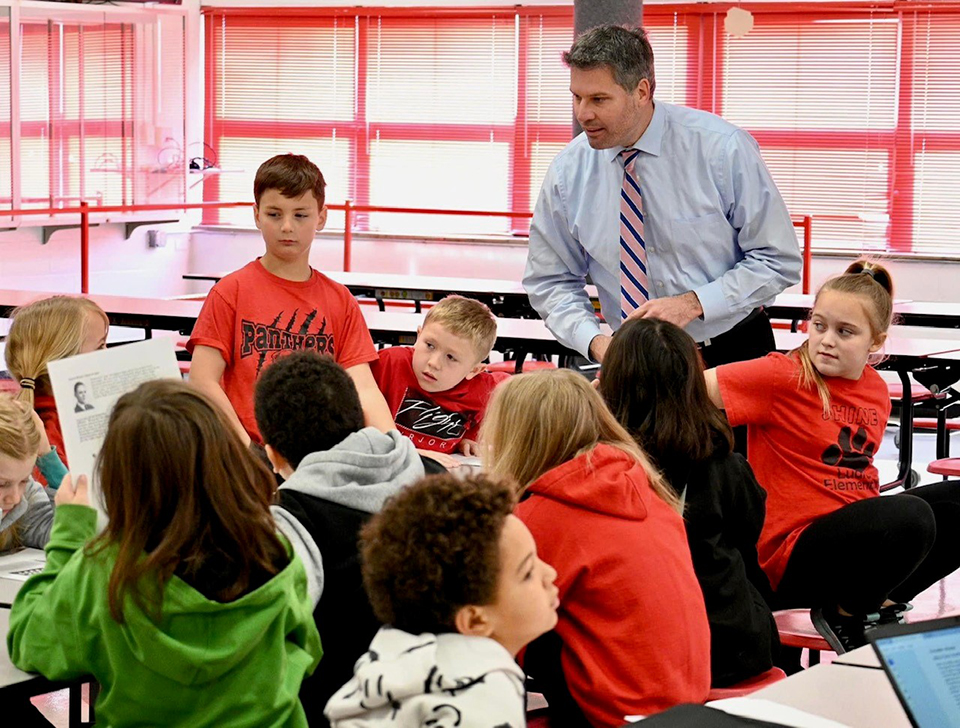
First-grade teacher Jamie Moss hands a bee buck to Maggie Crick for promptly starting her assignment at Earlington Elementary School (Hopkins County).
Photo by Amy Wallot, Oct. 16, 2014
By Brenna R. Kelly
Brenna.kelly@education.ky.gov
Every Friday at Madisonville North Hopkins High School, 10 students get to choose a prize after their names are drawn out of a box full of tickets. Their names are read over the speaker system to recognize them for being MOPS.
Maroons
Operate responsibly
Plan goals and have high expectations and
Show respect.
Students get the tickets when teachers see them living up to the motto. The prize is nothing big, said assistant principal Adam Harris – maybe a T-shirt, a snack or University of Kentucky paraphernalia.
What the students really get is recognition.
“They act like it’s cheesy,” he said, “but when they get called up here they are all smiling and happy.”
The drawing is one small part of Positive Behavioral Interventions and Supports (PBIS), which is now in its fourth year at the Hopkins County school.
“The main thing is recognizing students for doing the right thing,” Harris said. “That’s the whole concept behind it. But you have to find different ways to do it. You want to educate them about what the right thing is, then you want to reward them when they choose to do the right thing.”
Madisonville North Hopkins is one of more than 400 schools across the state to implement PBIS, a framework that allows teachers and administrators to take a proactive approach to discipline. The goal is to eliminate behavioral problems that impede teaching and learning.
Students are taught the expectations, and then acknowledged when they follow them. Schools also use data to track problem behaviors, including where and when they happen.
“With schoolwide positive behaviors supports, kids know what’s expected of them, they know what the rules are, they know there are consistent consequences,” said Gretta Hylton, executive staff adviser for the Kentucky Department of Education. “Expectations are talked, modeled and reinforced, kids are acknowledged and they are praised for good behavior.”
PBIS RESULTS
Suspensions among students at Madisonville North Hopkins High School
| All students | African-Americans | Special education | |
| 2011-12 | 299 | 95 | 97 |
| 2012-13 | 110 | 39 | 34 |
| 2013-14 | 72 | 28 | 20 |
Source: Madisonville North Hopkins High School
Over five years office disciplinary referrals have dropped:
11 percent elementary school
14 percent middle school
15 percent high school
Suspensions have been reduced:
45 percent for elementary over five years
7.1 percent for middle over three years
38 percent for high over five years
Source: School Wide Information System (SWIS) data for 205 Kentucky schools via the Kentucky Center for Instructional Discipline
The goal is to increase instruction both for students who might act out and for students who might have their learning interrupted while a teacher deals with an unruly student.
“The end goal is student learning, but you have to provide the supports needed to get there,” Hylton said. “It’s not just about settling down little Johnny. It’s about providing supports so that all students can be successful.”
While PBIS has been used in Kentucky schools for more than a decade, in the past two years thousands of the state’s educators have been exposed to the idea. In 2013, a new state regulation on the use of restraint and seclusion required all public school personnel to have annual training on increasing appropriate behaviors, responding to dangerous behaviors, relationship building and de-escalation, she said.
“No longer can your first reaction be restraint or seclusion,” Hylton said. “You have to have tried positive behavioral interventions, and if there is a restraint, one of the first things you have to document is what behavioral interventions you used prior to that restraint. The focus is on preventive measures rather than reactive discipline.”
To help districts meet the requirement, KDE worked with Kentucky Educational Television and other groups to develop free online training. In 2013, more than 58,000 people, including many out of state, viewed Promoting Positive Behavior in Schools I. This year, KDE and KET created new online videos, Promoting Positive Behavior in Schools II. More than 39,000 people have viewed the new course.
The department hopes that this exposure will encourage more schools and districts across the state to formally implement systems of schoolwide positive behavioral support, Hylton said.
That’s also the goal of Mike Waford, executive director of the Kentucky Center for Instructional Discipline, which provides free PBIS training.
All that’s required is a commitment from the district, Waford said. The center conducts a school survey and if 80 percent of the faculty buy in, the school’s leadership team will be trained. Another requirement is that schools be able to collect and analyze data such as office referrals and suspensions.
“I believe it’s vital for a school to have a conversation about what does discipline mean in our school,” he said. “That’s often never discussed, it’s just assumed.”
Schools set their own student expectations – such as respect, responsibility, effort and honesty. Then they develop rules based around them, such as how to behave in class, the cafeteria, hallway, on the bus or during arrival and dismissal.
“The whole idea is to create a routine for them,” he said. “It has to be taught and it has to be practiced.”
Schools also need a system of acknowledgement and recognition. At many, it’s tickets, with a drawing for a prize or a special seat in the cafeteria, a turn leading the lunch line or a technology day.
But it’s not the rewards that motivate students, Waford said.
“I believe the most powerful recognition is adult acknowledgement,” he said. “That, when students know that adults recognize their effort, they will try harder.”
And that’s what the numbers show. For the years 2011-12 and 2012-13, Kentucky schools with PBIS in place for three years had a reduction in suspensions that was double other comparable districts, 13.6 percent versus 6.7 percent, according to KYCID.
A year after PBIS was started at Madisonville North Hopkins High, suspensions decreased by 63 percent. A year later they were down an additional 34 percent.
Hopkins County Schools started PBIS in an elementary school in 2006-07, said Wendy Watts, district PBIS coach. While the district was expanding PBIS to other schools, it was named along with nine other districts in a complaint that groups of students were being suspended at rates disproportionate to their numbers, she said. As part of a settlement, the district agreed to implement PBIS across the board.
This is the second year of PBIS for all 14 Hopkins County schools and school buses.
“We are seeing steady improvement. We still have problems with kids, we still have behavior concerns,” Watts said. “This is not a quick fix, but what I do like is that we are being proactive. Instead of reacting and waiting for behaviors to occur, we are trying to prevent them.”
Each school’s PBIS team meets monthly to go over the data on behaviors, referrals and suspensions. The discipline data helps the schools determine what the problems are and when and where they happen. For example, a problem area might be in a hallway as students return from lunch on Fridays.
Data from the 2013-14 school year showed a high number of referrals in February, she said. So this year schools can plan to offer extra incentives that month.
About 80 percent of students respond to the program, but for those who don’t, most schools have Tier II teams with teachers, an administrator and a psychologist, Watts said.
“We try to figure out the basis for it, what’s going on,” she said. “If it’s homework issues, how can we help them do their homework. We try to prevent the issues from happening.”
The district also follows the 4:1 ratio. For every negative interaction a teacher has with a student, there should be four positive interactions, Watts said.
The district also celebrates all successes. It might be a celebration in the gym highlighting a reduction in referrals, or a postcard sent home that lets parents know a student did something good.
“Our favorite reward is something free,” she said. “They like stinky feet day, technology day, front of the line on your favorite lunch day.”
At Madisonville North Hopkins, students with no referrals at the end of each trimester get a treat. At the end of the year, students with no more than one referral get a PBIS reward day – half a day to play video games or other free activity, Harris said.
“It’s just a different way of thinking about how to approach discipline,” he said. “Is the most effective way going to be to send them home, or is it going to be to have a positive conversation with them and build a relationship?”
MORE INFO …
Gretta Hylton Gretta.Hylton@education.ky.gov
Mike Waford Mike.Waford@eku.edu
Adam Harris Adam.Harris@hopkins.kyschools.us
Wendy Watts Wendy.Watts@hopkins.kyschools.us



Leave A Comment